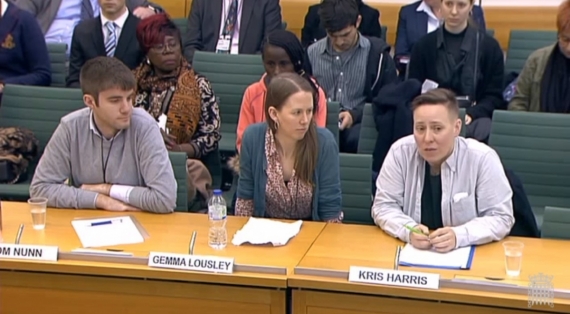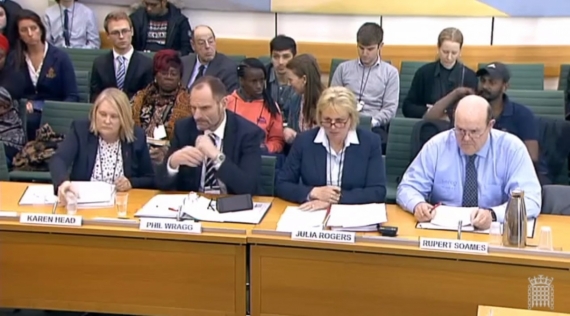Home Affairs Committee Evidence Gathering Session on Immigration Detention - March
Home Affairs Committee Evidence Gathering Session on Immigration Detention - March 2018
On Tuesday March 20th, the Home Affairs Committee took evidence from Medical Justice, Bail for Immigration Detainees, Women for Refugee Women, Serco and HMPPS Prisons Group on the subject of immigration detention. In particular, they were asking questions relating to Yarl’s Wood Immigration Removal Centre (which has recently been in the news because detainees have been hunger striking) and Morton Hall Immigration Removal Centre (where four people died in 2017).
The Home Affairs Committee is one of the House of Commons Select Committees related to "the expenditure, administration and policy of the Home Office and its associated public bodies". The Home Affairs Committee is chaired by Labour MP Yvette Cooper. At the end of their inquiry, the Home Affairs Committee can be expected to produce a report.
The session can be viewed online and the transcript can be read in full here with submitted written evidence.
A shorter summary or ‘digested read’ of the Home Affairs Committee session can be read on our website.

Session One: NGOs give evidence
Speaking: Kris Harris, Research and Policy worker at Medical Justice, Gemma Lousley, Policy and Research Coordinator of Women for Refugee Women and Tom Nunn, Legal Manager at Bail for Immigration Detainees (BID).
The Home Affairs Committee asked questions about the overall asylum detention system and about individual detention centres
Women for Refugee Women criticised the system of immigration detention as a whole, the failures of the Home Office’s Adult’s at Risk policy and the lack of a time limit in detention.
“[The Home Office’s Adult’s at Risk Policy’] introduced a clear presumption of detention against people who are identified as vulnerable, including survivors of sexual and other gender-based violence… We published a report last year that showed that 85% of the women we spoke to who had claimed asylum and who had subsequently been detained in Yarl’s Wood had survived rape or other forms of gender violence.”
“The other thing we would flag up in terms of the system of immigration detention broadly is the lack of a time limit. This is something we hear time and time again from the women we speak to. The fact there is no time limit on immigration detention has such a detrimental effect on people’s mental health.”
Bail for Immigration Detainees: “My main concern is the way the Home Office is currently dealing with this administrative investment in immigration detention. Many of the decisions to detain people are based on no logic at all. The decision to continue to detain people often feels very much like people are completely forgotten. They are there indefinitely until something happens.”
The HAC asked about concerns about specific centres.
W4RW criticised “routine intrusions on women’s privacy” and the use of male staff members for room searches.
“There is a culture of disbelief among the healthcare staff there. When women go and talk to mental health and other healthcare staff, it is assumed what they are saying about how they are feeling and what they are experiencing in terms of their health is not true.” W4RW questioned how the Home Office can assess the suitability of a person to remain in detention considering the culture of disbelief.
Medical Justice: “The Adults at Risk policy which is a huge area of concern for us... It is not working as advertised. It should lead to a reduction of detention of vulnerable people and length. Our experience is that it has done the opposite.”
HAC asked about the reasons for the high number of recent deaths of detainees.
Medical Justice spoke about the HMIP report on Morton Hall that said "there had been 4 incidents of serious self-harm and suicide attempts, yet there were no serious incident reviews and no systemic analysis. Only a month after that report, Five deaths."
HAC asked about the general atmosphere in Morton Hall and Yarl’s Wood.
BID: “In Yarl’s Wood there is a clear sense of desperation, more than maybe in some of the other centres. There are a lot of people that are really eager to get legal advice and for whatever reason they are not able to get it. When I go in I will have people waiting for over four hours in the corridor to get 10 minutes of legal advice from us.”
W4RW: “In Yarl's Wood there is an extreme feeling of insecurity and anxiety. The prison inspectorate found that 47% of the women said that they felt unsafe. It was to do with the indefinite nature of their detention and not knowing what was going to happen to them.”
Stephen Doughty of the HAC asked about issues arising from “the detention of convicted criminals awaiting deportation alongside immigration detainees.” He said that they had received a number of complaints and asked whether the NGO panel thought that the practice must be stopped.
BID: “I think there is a problem with the term Foreign National Offenders, we need to think of all the people that might include. I think it’s important we don't put people all in this one box. You have lots of people who have grown up here, who have gone to school here, who have gone to secondary school here, a large number of people who have spent lots of time in the care system and who have committed their first offence when they were 15. In terms of the mixing between people, I do not think there is ever an issue. I have always seen a real sense of solidarity.”
On Foreign National Offenders, Medical Justice agreed: “It is a false dichotomy and it asks the wrong question. To me it is about who needs to be in detention and why they need to be there. Nobody is in detention as part of a criminal sentence so when we are talking about foreign national offenders, we are talking about sentence served foreign national offenders. Had they been British they would have been released into the community under licence. If they are considered a risk they would be retained in prison, so they have to have a risk assessment in order to be transferred to the detention centre. It is my opinion that foreign national offenders should be released at the end of their custodial sentence.”
Stephen Doughty continued: “In terms of the day to day lived experience of the detainees, there is clearly a difference between somebody who has spent a significant amount of time inside serving a sentence for a serious crime and somebody who has never experienced any time in detention and has been picked up by the immigration service?”
Medical Justice said that it was difficult to generalise.
W4RW: “We've spoken to a number of asylum seeking women who had served prison sentences because they had been criminalised by the asylum system. There was a woman who had been trafficked to the UK on a false passport and was then subsequently imprisoned."
HAC asked about drug usage within detention centres.
Medical Justice: "When you have a deeply vulnerable population, locked up in these environments with nothing to do... with boredom, lack of purpose, anxiety over your case, fear for being returned to a country where you fear for your life, people might turn to drugs for relief"
HAC asked about the lack of independent advocacy advice. “where isn’t the system doing what it should do to make sure that people in the immigration centres can go to someone who is genuinely independent, who will be genuinely concerned about the way they are being looked after and be able to do something about it?”
BID: “Fundamentally in all of this, there is a huge problem in terms of trust… If you look at what has happened with the hunger strikers, when they raised their concerns—and their concerns are not about conditions in Yarl’s Wood, they are more about the way that this whole estate operates—they get a letter from the Home Secretary saying, “We are now going to speed up your removal”. I do not think that anyone in that situation is going to talk to someone who is so-called independent. It is a fundamental problem with the system that we have, the system of indefinite immigration detention.”
W4RW echoed this point: “Women there are peacefully protesting and they've been met with letters of removal... It's an issue of trust. How on earth are they going to trust the system that they are contained within?”
HAC asked whether the initial screening process has adequately identified vulnerable people?
W4RW: “One of the key things that we found from our research is that there is, at the moment, under the adults at risk policy no proactive screening process that works to actively identify if someone is vulnerable before the point of detention. What that meant in practice for so many of the women that we spoke to, who were survivors of rape or other forms of gender violence, was that they were detained because the Home Office had only been looking at what they already had on file. They did not actively ask any questions to try to identify any other vulnerabilities.”
BID: “Home Office decision making on that point has got worse because what they now do is they will accept that someone is a victim of torture … but they will say that due to the exceptional circumstances in your case you therefore must remain in detention. Those exceptional circumstances are a risk of absconding because you had not signed on once with the Home Office during a three year period, or whatever it is.”
Medical Justice said that the number of Rule 35 medical reports resulting in release was at about 35% but then after the introduction of the Adults at Risk policy it fell dramatically to about 10%.
“This term 'immigration factors' covers any compliance issues - this is then held against people. There is a balancing act, "Oh you're a victim of torture but you missed an appointment two years ago. I think we'll just keep you in detention." It's nuts.”
“In my opinion, 'we' are responsible for all that harm that might happen [in detention]. We knew it might happen, we sat and waited for it to happen, we recorded it and then released people. I think that is completely unacceptable.”
W4RW: “HMIP found that since the intro of the Adults at Risk policy, there are greater numbers of women being detained in YW, who have evidence they are victims of rape, trafficking and torture. They have the evidence but the Home Office is just not letting them out.”
"We spoke to women who had attempted suicide in detention and the Home Office still refused to release them. That should not be happening under a policy that is supposed to be safeguarding and protecting vulnerable people."

Session Two: Yarl’s Wood and Morton Hall Administrators give evidence
Speaking: Rupert Soames, CEO of Serco Group and Julia Rogers, MD Justice and Immigration of Serco Group.
Phil Wragg, Director for Kent, Essex, IRCs and FNPs at HMPPS Prisons Group and Karen Head, Morton Hall Centre Manager of HMPPS Prisons Group.
The Home Affairs Committee asked questions about the operation of the Independent Monitoring Boards as a mechanism for complaints – how are detainees signposted towards IMB? Is the use of boxes in the centres to take complaints successful?
The HAC discussed the use of cameras by operational staff – when is something recorded and when is it not recorded? When there is a complaint, is it always recorded?
Chair asked Serco about the number of people on hunger-strike. Serco gave evidence (biometric data on access to the dining hall and food shop) that suggested there were few people on hunger strike: “We have had a maximum of 81 people who were not attending for all three meals. However, every single one of those people—and I can prove that because we equally have a system that operates for people to buy items from the shop in Yarl’s Wood—were purchasing food items from the shop. There have only ever been five people, and only for very short periods of time, where they were neither attending for meals in the dining room and nor could we see they were purchasing food from the shop.”
The HAC asked what welfare support is being given to women refusing any food? Serco made reference to NGOs and visitor groups being allowed into Yarl’s Wood as an example of appropriate welfare.
Serco were asked questions about the letter being given out by the Home Office that threatened expedited deportation for those on hunger strike. Serco say that this is Home Office policy and they have no say on it. Chair refers to threats made to hunger-strikers by Serco staff of being deported from Yarl’s Wood on a drip. Serco said they had no knowledge of this.
Asked about deaths and attempts at self-harm in Morton Hall, HMPPS Prisons Group said that of the four deaths last year, two were self-inflicted and two were due to “natural causes” but all were subject to inquests. Since then there has been one instance of serious self-harm and possibly instances of less-serious self-harm.
HMPSS: “There is an element of frustration within the centre at being in detention and an element of anxiety in terms of the unknown, there being no end date to detention, not knowing when they are going to be released. Some of the triggers for acts of violence and acts of self-harm have been being served removal directions, being told that you have had your bail refused, being told that your avenues of appeal have been exhausted.”
HMPSS talked about illicit and psychoactive substances being brought into Morton Hall and the impact of that on people detained there. They discussed how these substances were getting in, through weaknesses in the perimeter fence, through members of the public throwing packages over the fence, through the mail (staff are not allowed to check mail except is specific circumstances) and through visitors.
Serco spoke about the complimentary nature of the reports made by HMIP, IMB, the Shaw report since 2015. The HMIP report found that 87% of detainees felt that they were treated with respect by staff. He said that “We can fall back on independent reviews and say that people who come into Yarl’s Wood say it is not an abusive place, it is not a place where misconduct or abuse is tolerated.”
Serco let go of five staff members in five years over accusations of abuse. All five were referred to the police, three of them led to criminal prosecution but in all three cases the persons were found not guilty. One case was charged with rape, three of them charged with misconduct in a public office. The other two were for sexually inappropriate behaviour.
The HAC questioned whether a lack of evidence, CCTV cameras and body-worn cameras would have resulted in instances of abuse not going to trial. He also raised concerns that detainees might have about punitive responses to complaints raised. “How genuinely effective is a complaints procedure? Are they really able to complain to someone who is genuinely independent, and are therefore able to get a fair hearing and something done about it? There seems to be a disconnect between people who have had inappropriate behaviour right through to abuse, and them actually being reported and taken up.”
The HAC said that “there is a general confusion and lack of trust as to who actually is working for somebody who could influence their case.” Serco acknowledged that this is the case.
In the discussion of independent means of complaining and challenging injustices in detention, Julia Rogers of Serco said that “we have an independent monitoring board. They are independent of us and the Home Office. All of the residents in Yarls Wood have access to mobile phones and the internet. In our post room we signpost them to whistleblowing hotlines, the NGOs, “befrienders”, the chaplaincy and to legal advice. We signpost them to and give them access to any means they wish to have to communicate to anybody that they wish to communicate with about how they feel and any complaints that they have.”
The HAC asked “has the government’s Adults and Risk policy achieved the aims of reducing the number of vulnerable people in detention?”
HMPPS: “I think it has identified adults at risk in detention but it hasn’t reduced the number of people who are coming into our care. I don’t think the ability is there for it to do that… [the policy] allows us to focus in on what the detainee’s care needs are but it’s not actually going to reduce the number of people coming to us.”
Serco: “If you are asking me whether I have more or less people who are vulnerable, we have a consistent amount of people who are vulnerable. I would say that all the ladies in Yarls Wood are to some extent or another are vulnerable and we treat every one of them as if they were and give them our best care. But by the definition of “vulnerability” we are broadly at the same numbers.” Julia Rogers adds that often women don’t reveal their vulnerability until after they have been in the centre for some time and trust with staff has been built.
When pressed, Serco then went on to agree that there are instances where a vulnerability is identified but that person remains in detention.
Chair asked both Serco and HMPPS how many people are recorded as survivors of torture but remain in detention. Neither organisation had that number to hand. Chair said that that information seems like it would be one of the most important things to know. They said they would provide this evidence in writing.
HMPPS gave evidence about the Adults at Risk policy and those held in Morton Hall who have had Rule 35 reports made about them. There are currently 35 people classified as “Level 1”, 64 as “Level 2” and 0 as “Level 3”. The maximum capacity at Morton Hall is 392. Determinant factors for each level are made by the Home Office. Level 1 are those that self-declare a vulnerability.
Chair asked HMPPS whether they have concerns about people who are vulnerable, are at risk, and shouldn’t be there. HMPPS said that “On occasion. Yes.” and that they do ask for cases to be reviewed. They estimate that they ask for review of “maybe 4 or 5 [cases] a month”. “There is just over a two week waiting list to be seen by a doctor, with a Rule 35 report following that appointment… if it’s an appointment specifically for an allegation of torture… but it doesn’t take them 2 weeks to see a doctor. There is a maximum of 5 days wait to see a member of the mental health team, unless its deemed to be urgent. The Home Office should respond within 3 days of receiving the Rule 35 report. Sometimes they do, sometimes they don’t, sometimes we wait a couple of weeks or so.”
Chair: “HMIP 2017 Yarl’s Wood report identifies it taking 8 weeks to finalise Rule 35 reports from start to being completed. 8 weeks for someone who maybe should not be in detention in the first place is pretty shocking.”
Serco: “Serco does not get involved in the Rule 35 process because it’s done by the healthcare provider [G4S]… We don’t provide the medical intervention so therefore [we aren’t to blame for] the time lag.”
Chair: “We are hearing that the system is failing, that there are adults at risk and people who have been tortured being held in detention.” The Chair criticised those at the most senior level not having a complete understanding of the scale of the problem, so to flag it with the Home Office.
Chair: “Does the indefinite nature of detention cause you problems?”
Serco: “For the Home Office it may not be indefinite detention – it’s detention while your case is going through – but for the person being detained, by definition its indefinite because they don’t have a definite date when they’re coming out. It is incredibly difficult dealing with people at an incredibly vulnerable time in their lives in difficult circumstances.”
HMPPS: “We are there to provide a duty of care and part of that is providing hope. Indefinite detention removes some of that hope. It’s a very difficult place to be in when they can’t understand where the rest of their life is going. We do know that the majority of the reasons for men being placed on an ACDT is to do with anxiety around the unknown, and not knowing how long they are going to be in detention.”
When asked about the disparity between Rupert Soames pride in Serco’s running of Yarls Wood and the descriptions given by NGOs, Soames replied that he believes “the conditions that people complain about, are not so much the conditions of their residency there, but the process that they are in, which let’s face it is a difficult process.”
The HAC: “You cannot say that the welfare at Yarls Wood is satisfactory without also being satisfied with the Adults at Risk policy, which means you would have to totally not accept the evidence that we have already taken about the deficiencies of that policy.”
Chair: “Based on the evidence we have heard, we would expect you, if you were fully engaged with the welfare of the people that you have in detention, to be screaming that the system is not working. We have just heard sufficient evidence of victims of torture, of people who are deeply traumatised by the process of detained, who end up not being deported at the end of the process, who end up actually not needing to be in detention in the first place. If you were really doing your job to properly look after the welfare of the people in the detention centre, surely you would be raising the red flag a lot about all of those cases that are going wrong.”




